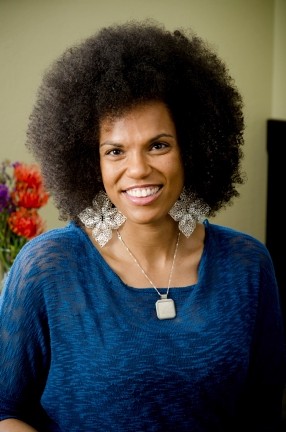Spoken word artist looks at the role of youth in educational justice - Thursday, April 25, at 7 p.m.
TACOMA, Wash. – Walidah Imarisha, a spoken word artist, educator, writer, and innovative voice on issues of youth and justice, will perform with the Fab-5 artistic youth group on Thursday, April 25, at University of Puget Sound.
The spoken word performance New Faces, New Voices: The Role of Youth in Educational Justice will take place from 7 p.m. in Schneebeck Concert Hall. Entrance is free and everyone is welcome. Tickets are not required.
Imarisha will address an educational system that she sees as suffering from a virus that is “much more insidious” in the ways that it damages young people than in the days of overt racism—because prejudices have been driven underground.
“Students,” she told Professor Dexter Gordon in a recent video interview, “feel marginalized, silenced, invisibilized, demonized, criminalized, without that being said explicitly. They’re not learning about themselves and everything they do learn about themselves is negative. Many young, brilliant folks have dropped out of school because they were saving their spirits. And we have to see that as a survival tactic.”
Thelma Jackson, education consultant to five Washington governors and owner of Foresight Consulting, will open the evening with an introductory talk. This is the final in a series of three public events titled American Voices: Invisibility, Art, and Educational Justice and presented by the Race and Pedagogy Initiative at University of Puget Sound, with support from the Catharine Gould Chism Fund.
Walidah Imarisha teaches in Portland State University’s Black Studies Department, Oregon State University’s women’s studies program, and Southern New Hampshire University’s English department. One half of the poetry duo Good Sista/Bad Sista, she uses her art and scholarship to explore identities and to examine methods of control—historic and contemporary.
As a lecturer, organizer, and poet, Imarisha has toured the country, regularly challenging people to consider issues that are not often a part of public conversations. One tour involved a talk by Imarisha on “Why are there so few black people in Oregon?”
Imarisha told the Women of Color zine that the answer stems from the historical creation of institutions designed for “white, straight” men. She says it is essential for that process to be understood today.
“If we don’t see this [process], then we can’t see why students of color are dropping out at twice the rate of white students, and why LGBTQ students of color are dropping out at an even higher rate,” she told the online magazine. “This is not history—this is the foundation for the institutions that shape our lives every day in the here and now. And it affects and constricts all of our lives.”
Imarisha has facilitated poetry and journalism workshops in community centers, youth detention facilities, and women’s prisons. She was one of the editors of Another World is Possible, the first anthology about the 9/11 tragedy, as well as the first editor of the political hip hop publication AWOL Magazine. She spent six years on the board of the Central Committee for Conscientious Objectors, and helped to found the Human Rights Coalition, a group of prisoners’ families and former prisoners in Pennsylvania.
Fab-5, a Tacoma youth organization started in 2000, aims to cultivate a sense of community by providing creative outlets for underserved, urban youth. At the group’s Hilltop center Fabitat, workshops in DJing and music production, creative writing and spoken word, breakdancing, and visual art are held throughout the year.
Fab-5 is involved in educational programming with public schools, after-school centers, and juvenile detention facilities. At University of Puget Sound, Fab-5 has a hip hop radio show on the student-run station KUPS.
For more information about American Voices: Invisibility, Art, and Educational Justice contact the Race and Pedagogy Initiative at 253.879.2435 or visit pugetsound.edu/raceandpedagogy.
To view a video interview with Walidah Imarisha visit: https://vimeo.com/63264018
For directions and a map of the campus: pugetsound.edu/directions.
For accessibility information please contact accessibility@pugetsound.edu or 253.879.3236.
Press photos of Walidah Imarisha can be downloaded from: pugetsound.edu/pressphotos.
Photos on page: Fab-5 members Kenji Stoll, Eddie Sumlin, and David Long (from left), with Walida Imarisha, at the Fab-5 community center Fabitat. Photo by Ashley Solus. Above: Walida Imarisha.
Tweet this: Come hear @WalidahImarisha and Fab-5 artists about youth’s role in educational justice @univpugetsound, 7pm, April 25, free.
Follow us on Twitter! twitter.com/univpugetsound
